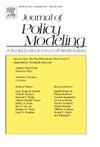卢旺达在 COVID-19 大流行期间采取的全经济复苏措施:有多大借鉴意义?
IF 3.1
2区 经济学
Q1 ECONOMICS
引用次数: 0
摘要
为应对 COVID-19 大流行,许多中低收入国家(LMICs)的政府立即采取了严格的公共卫生措施来遏制感染的蔓延。这些措施对经济造成了负面影响,而且影响往往很大,因此有必要迅速采取经济救济和恢复措施,以重振经济增长和保护受影响的家庭。卢旺达因其有效的公共卫生政策应对措施和对 COVID-19 的适应性经济政策应对措施而在其他低收入和中等收入国家中脱颖而出。本文利用卢旺达的动态可计算一般均衡 (CGE) 模型,评估了这些政策措施对整个经济和福利的影响,并将结果与应对 COVID-19 的整体政策相结合。在卢旺达疫情早期阶段得出的建模结果表明,2020 年引入的救济和恢复措施可减轻 COVID-19 的衰退影响,使国内生产总值(GDP)总量减少约 0.8 个百分点,帮助恢复约 115,000 个工作岗位,并通过现金转移显著减少贫困家庭的收入损失,这些措施的总收益超过其成本的比率为 2.2。这些结果表明,在决策过程中及时使用全经济建模具有广泛的推广价值。本文章由计算机程序翻译,如有差异,请以英文原文为准。
The economywide recovery measures in Rwanda during the COVID-19 pandemic: How useful a lesson?
In response to the COVID-19 pandemic, governments in many low- and middle-income countries (LMICs) immediately introduced strict public health measures to contain the spread of infection. The economic consequences of these measures were negative and often large in magnitude, necessitating the rapid introduction of economic relief and recovery measures to reinvigorate economic growth and safeguard affected households. Rwanda stands out among other LMICs both for its effective public health policy response and its adaptive economic policy response to COVID-19. Using a dynamic computable general equilibrium (CGE) model of Rwanda, this paper assesses the economywide and welfare impacts of these policy measures and contextualizes results within the overall policy response to COVID-19. Modeling results generated at an early stage of Rwanda’s pandemic experience indicated that relief and recovery measures introduced in 2020 could mitigate COVID-19′s recessionary effects by about 0.8 % points of total GDP, help to recover about 115,000 jobs and, through cash transfers, significantly reduce income losses among poorer households, with total benefits from the measures exceeded their cost by a ratio of 2.2. These results demonstrate the widely replicable value of economywide modeling when used in a timely manner and when positioned within a policymaking process.
求助全文
通过发布文献求助,成功后即可免费获取论文全文。
去求助
来源期刊

Journal of Policy Modeling
ECONOMICS-
CiteScore
6.20
自引率
11.40%
发文量
76
期刊介绍:
The Journal of Policy Modeling is published by Elsevier for the Society for Policy Modeling to provide a forum for analysis and debate concerning international policy issues. The journal addresses questions of critical import to the world community as a whole, and it focuses upon the economic, social, and political interdependencies between national and regional systems. This implies concern with international policies for the promotion of a better life for all human beings and, therefore, concentrates on improved methodological underpinnings for dealing with these problems.
 求助内容:
求助内容: 应助结果提醒方式:
应助结果提醒方式:


